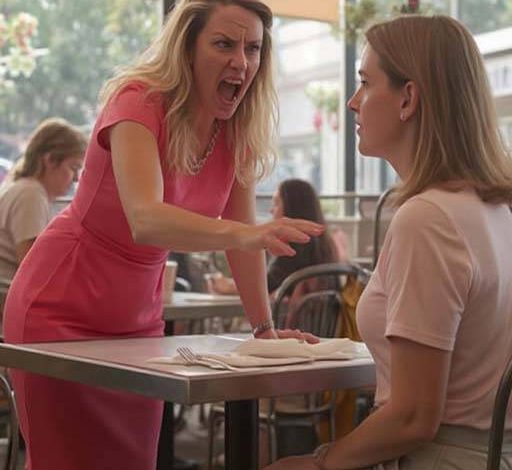Entitled Woman Demanded We Stop Using Sign Language Because It ‘Made Her Uncomfortable’— But What the Waiter Did Next Was Instant Karma

My closest buddy is deaf and I’m hard of hearing. An arrogant mother went up and urged us to stop signing at a café, calling it “disruptive” and “inappropriate.” A waiter interrupted the silence with a wonderful message about respect, decency, and real inclusion.
Lila, 22, is hard of hearing since infancy. I’ve always spoken and touched two languages.
I always identified with sign language. I express myself completely. My closest buddy Riley, who is deaf, and I converse freely, honestly, and enthusiastically.
I entered Hazelwood Café, our customary hangout, on Tuesday afternoon. I felt warm and cozy with cappuccino and cinnamon buns. Riley was immediately noticeable, her wavy hair bouncing as she grinned at her phone.
Best pals since high school. We strengthened our bond while others weakened. Silent chats in large auditoriums and laughing at jokes no one else could hear. Our connection is based on understanding, not sound.
I signed, “Sorry for being late. Traffic was awful.”
Her eyes rolled wildly. I assumed you left me to prevent my sourdough failure.”
My fingers flew as I laughed. “You tried again?”
She signed with m.0.c.k offense, “Don’t judge me.” “It looked easy on TikTok.”
Just before I teased her, I saw a small child at a neighboring table observing us carefully. He looked seven, curious. I waved and he grinned and wiggled his fingers.
Riley looked. He’s adorable. Look at him copying our signs.”
I smiled and nodded. This kind of calm connection with strangers and the chance of learning something new warmed my heart.
However, his mother was less than pleased.
She was first too focused on her phone to notice him observing us. The moment he signed back, she snapped. She shouted, “Stop that!” and pulled his hands down. “We don’t. That’s rude.”
Riley’s hands stilled. My throat tightened. We’ve seen awkward glances, awkward inquiries, and sign language being treated oddly. Outright hostility? Still hurt.
Our mother continued staring at us like we were speaking in tongues to irritate her.
Want to leave? Riley signed smaller than usual.
Shaking my head. “No way. Like everyone else, we belong.”
But air tension tightened around us. A mother suddenly rose, pulling her kid by the wrist. Her shoes clanked as she approached our table.
“Excuse me,” she hissed. “Please stop gesturing.”
I blinked. “You mean sign language?”
Her hand waved dismissively. Whatever you name it. It distracts. Your hands are whirling like windmills as my kid eats lunch.”
The usual heat rose in my face. Riley had stiff shoulders as she stared down.
“I’m sorry, but this is how we communicate,” I responded firmly. “That’s not disruptive.”
She snapped, “Oh, please.” A dramatic experience. My kid shouldn’t watch mature ladies yelling and having a fit. Can you do it with greater privacy?
Shocked. Her kid, the eager child who smiled at us minutes before, seemed horrified. He gently pulled her sleeve. Mom, stop. They did nothing wrong.”
She ignored him.
She said, “What kind of example are you setting?” “You’re inspiring him to think that’s normal!”
I breathed to calm down. It’s normal. Sign language is spoken by millions worldwide.”
She sneered. Spare me. This is why civilization is coming apart. All desire to be exceptional. Guess what? We are just trying to live our lives without being compelled to accommodate your theatrics.
What I heard was unbelievable.
“You don’t have to accommodate anything,” I answered nervously but clearly. You just have to mind your own business.”
The café was quiet. Every table was quiet, listening. Riley gazed blankly forward. She sensed the hatred even if she couldn’t hear the words.
Then, salvation.
Our table was served by café regular James. He wore a towel over one arm and a calm, solid look.
Is there a problem?he inquired.
Woman betrayed him. “Yes! These two are acting inappropriately. Distracting my youngster and creating a scene. I insist you stop them.”
An eyebrow lifted by James. “Ma’am, I’ve been watching. The only troublemaker is you.”
Her mouth opened. Excuse me?
“Sign language isn’t disruptive,” he replied steadily. “You know what? Insulting consumers for talking.”
I gazed at him in awe. Riley relaxed as she observed the discussion.
I don’t want my youngster to see—
“To what?” James paused. “Communication? Diversity? If that’s your worry, reassess your parenting style.”
Some low claps came from a table near the window. Their acclaim spread around the café.
James said, “We welcome all guests. We don’t allow any prejudice.”
Red spots covered the woman’s face. Holding her son’s hand, she whispered, “Come on, Nathan. We leave.”
Nathan paused. He stared at her, then us. He approached Riley and me.
“I’m sorry,” he signed softly. “She’s wrong.”
My eyes watered.
Riley said, “Thank you. You did nothing wrong.”
He paused, then said, “How do you sign ‘friend’?”
Riley gently demonstrated. Nathan easily imitated her contour with his fingertips.
He murmured “Friend.”
Yelled his mother, “Now, Nathan!”
He smiled at us again and signed “friend” before following her out.
The moment echoed like a song. James reappeared with two warm cookies on a tiny platter.
“These are on the house,” he replied. “And I’m sorry you went through that.”
Voice wavering, I stared at him. “You stood up for us without having to. Thank you.”
Shrugging. My oldest sister’s deaf. People glance at her. Knowing how it feels.”
We exchanged lengthy, thankful looks. Riley grabbed my hand across the table.
You okay? she signed.
I nodded. Because of you. And James. That courageous kid.”
Café life resumed. The strain eased. Passing strangers smiled at our table. A senior lady leaned over and remarked, “Your language is beautiful. Thank you for sharing.”
We carefully finished our cookies, enjoying their sweetness and the uncommon sense of being seen without judgment.
Sunshine was warm and beautiful outside. Riley and I remained on the walkway, hesitant to separate.
She asked “Same time next week?”
I said, “You bet,” smiling. No matter who watches.”
As I went to my vehicle, I thought of Nathan’s open heart, willingness to learn, and modest resistance against ignorance.
Maybe we can’t change everyone. We can sow seeds.
Maybe those seeds will blossom into a world where speaking in your own language isn’t considered “disruptive”.




